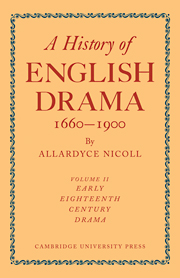Book contents
Summary
Types of Augustan Comedy
It has already been noted that comedy, during the fifty years from 1700 to 1750, was more patronised by the play-goers than tragedy. All through this time three or four comedies were produced to one tragedy; in certain years the proportion was even higher than that; it never sunk below. This, however, presents in itself nothing extraordinary, tragedy in all ages being less welcomed by work-weary or war-weary or dilettante spectators than the brighter and, in a way, less exacting forms of drama. What is of excessive interest for our study is to note what particular forms of comedy were the most popular, in an attempt to gauge the precise tendencies of the age.
Before coming to the actual repertoires, it may be well to indicate briefly the main types of comic development in the reigns of Anne and of the Georges. The last years of the seventeenth century had handed on to the era of Cibber a series of very definite comic traditions. The comedy of manners was in the full flush of its highest bloom in Congreve when the year 1700 came. The Way of the World appeared in the first year of the new century, and even Jeremy Collier's outburst seemed to have done little as yet towards chastening the irresponsible gaiety which characterised the type.
- Type
- Chapter
- Information
- History of English Drama, 1660–1900 , pp. 125 - 217Publisher: Cambridge University PressPrint publication year: 1952



